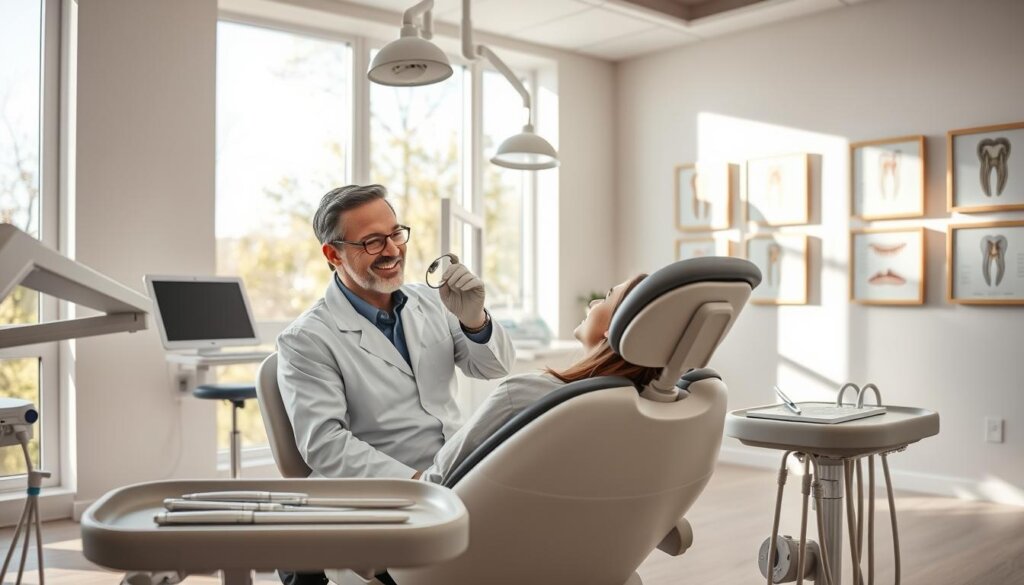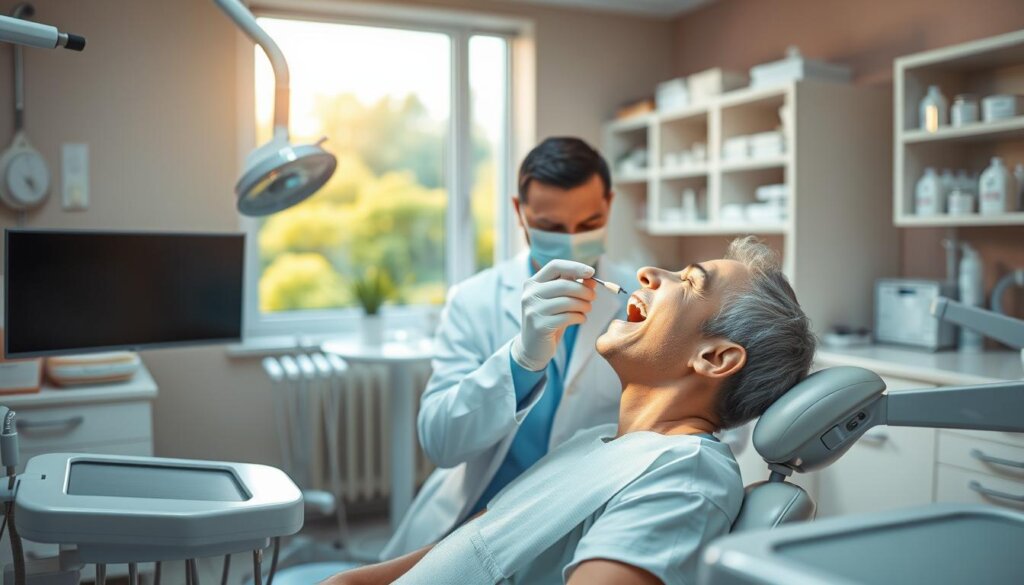What if I Haven’t Been to the Dentist in Years?
About one-third of American adults skipped seeing a dentist last year. This neglect can lead to many oral health problems that hurt our overall health. This big number shows how common it is for people to not go to the dentist regularly. Life changes, like moving, starting a new job, or changing insurance, can make us forget about our dental health.
When we skip dental check-ups, we might not notice problems like cavities or gum disease early on. If we don’t treat these issues, they can get worse and harm our mouth and body health.
Key Takeaways
- A significant number of adults in the U.S. forego necessary dental visits each year.
- Dental care neglect can lead to serious, undiagnosed oral health concerns.
- Common reasons for missing dental appointments include life changes and insurance adjustments.
- An overdue dental appointment can result in the progression of dental diseases.
- Proactive steps should be taken to schedule a dental check-up and address any oral health concerns.
Understanding the Importance of Regular Dental Check-Ups
Seeing your dentist often is key to keeping your mouth healthy. It helps stop problems before they can hurt your health. These visits teach you about dental hygiene habits for taking good care of your teeth and gums.
Why Regular Visits Matter
Going to the dentist regularly is super important. These check-ups can catch problems like cavities or gum disease early. They also do deep cleaning to get rid of plaque and tartar you can’t at home. Plus, you’ll get advice tailored to help you keep your mouth healthy.
Consequences of Skipping Appointments
When you skip dental check-ups, it’s bad news for your oral health. Plaque and tartar build up, leading to gum disease and cavities. This can cause tooth loss or worse health issues later. It also makes future treatments more complex and expensive. So, seeing your dentist often is crucial for your mouth and overall health.
If you’re curious about what happens if you don’t treat dental problems, check out composite fillings. You’ll learn about ways to prevent and treat these issues.
Common Concerns About Returning to the Dentist
Going back to the dentist after being away for a while can be scary. People often worry about dental anxiety and fear of being judged. It’s important to understand these fears before your dentist checkup.
Many people are scared they will be judged for their oral health. They worry the dentist will comment negatively if their teeth or gums have gotten worse.
Fear of judgment can be paralyzing, but remember, dental professionals are here to help improve your health, not criticize your past habits.
Dental anxiety also stops a lot of people from seeing their dentist. This anxiety can come from fear of pain, bad experiences in the past, or even the sounds and smells at the dentist’s office. To deal with this fear, dentists need to be understanding and kind.
- Inform your dentist about your anxiety; transparency can lead to a more tailored and comfortable experience.
- Seek a dentist who specializes in treating anxious patients or offers sedation options.
- Consider cognitive behavioral therapy if dental anxiety is severe and persistent.
What to Expect During Your First Visit Back
Coming back to the dentist might make you feel both excited and nervous. The journey begins with a dental checkup that involves a comprehensive oral examination. This first check helps dentists fully understand your oral health and plan your care.
In this talk, you’ll share any dental worries you have. You’ll get advice on how to prevent problems and learn about treatment options. This approach is not just for current issues. It’s also about keeping your teeth healthy long-term.
Initial Assessment and Consultation
Your visit will start with a full check-up of your teeth, gums, and mouth. This check aims to spot any decay, gum disease, or other issues. It makes sure nothing is missed if you’ve been away from the dentist for a while.
X-Rays and Other Diagnostic Tools
To get a closer look at your oral health, your dentist might use X-rays. These are key in finding problems that can’t be seen in a normal exam. This includes issues under the gum, between teeth, or beneath fillings.
X-rays are vital for pinpointing hidden problems, ensuring your mouth’s health is fully checked. With these tools, dentists can create a custom treatment plan that really fits your needs.
| Examination Component | Description | Importance |
|---|---|---|
| Visual Inspection | Assessment of teeth, gums, and mouth. | Identifies visible issues like cavities or gum inflammation. |
| Digital X-Rays | Images of the internal structures of the mouth. | Essential for detecting hidden problems not visible to the naked eye. |
| Palpation | Examination by touch to find abnormalities. | Checks the integrity of jawbones and the existence of abnormal growths. |
Both a dental checkup and a comprehensive oral examination are key. They help not just with current issues but also prevent future ones. If you’re worried about returning after a long time, know that modern dental care is ready to help you gently and effectively.
How to Prepare for Your Appointment
Getting ready for a dentist appointment helps make the visit better and more comfortable. Make sure to have your medical history and any questions ready. This makes the visit go smoothly and helps you get the most out of it.
Gathering Relevant Medical History
Before seeing the dentist, gather any medical records that could affect your dental care. Include information on surgeries, treatments, or medications that might impact procedures. This lets your dentist personalize their care for you.
Creating a List of Questions for Your Dentist
You should also think about what you want to ask your dentist. You might have questions on how to take care of your teeth, how to manage pain, or the cosmetic treatment options available.
| Category | Details to Include |
|---|---|
| Medical Conditions | Diabetes, heart conditions, allergies |
| Medications | Prescriptions, over-the-counter drugs, supplements |
| Past Dental History | Previous surgeries, ongoing treatments, past issues |
| Cosmetic Concerns | Interest in whitening, braces, veneers |
Evaluating Your Oral Health After Years Away
After a long break from the dentist, it’s crucial to check your oral health. Look for any signs of tooth decay or gum disease. It’s especially important before going back to regular dentist visits.
Watch out for symptoms like sore gums, bleeding when you brush, constant bad breath, or pain. Talking about these with your dentist helps with getting the right care.
Regular check-ups can stop gum problems from getting worse. This shows why dental care is so important.
Knowing how your oral health has changed can help you get timely care and prevent issues.
| Sign | Common Indications | Severe Indications | Potential Risks |
|---|---|---|---|
| Tooth Decay | Visible holes in teeth, tooth sensitivity | Significant cavity, dark spots on teeth | Loss of tooth, infection |
| Gum Disease | Red or swollen gums, bleeding when flossing | Pulling away of gums from teeth, loose teeth | Periodontitis, possible tooth loss |
Your dental health is key to your overall well-being. It’s vital to act on any dental problems right away. Catching these issues early means treatments can be simpler and less harsh. So, even if it’s been years since your last dental visit, starting to take care of your dental health now is important.
Potential Treatments You Might Need
If you haven’t been to the dentist in years, an in-depth check-up might show you need several treatments. These aren’t just to make your smile look better. They’re key in stopping more dental problems and keeping you healthy overall.
Professional dental cleaning and scaling are usually first on the list to remove plaque and tartar. This is especially important to fight or prevent gum disease. These steps are the start to healthier gums and teeth, lowering the chances of periodontal issues.
As your treatment moves forward, restorative dentistry becomes very important. Here are some of the treatments you might need:
- Fillings to fix cavities from decay
- Crowns to cover and protect damaged teeth
- More complex treatments like root canals for infections
These steps aim to fix your teeth’s function and look while solving problems like decay or infections. Those could cause bigger health issues if ignored.
Gum disease treatment isn’t just about dealing with symptoms. It’s about tackling the real causes to stop it from getting worse and coming back.
Regular professional cleanings and restorative care will greatly improve your teeth and gums’ health and longevity.
Cost Considerations for Long-Delayed Dental Care
Going back to the dentist after a long break can reveal the cost of oral health. It helps to know both affordable dental care options and the ins and outs of dental insurance. This can really help with the average cost of a dental visit.
When you think about dental visit costs, insurance is key. A usual check-up might include checking your teeth, cleaning them, X-rays, and sometimes checking for mouth cancer. Without insurance, these can cost between $150 to $350.
Dental Insurance Coverage
Dental insurance plans differ a lot. Most pay for preventive care fully, basic stuff by about 50-70%, and big procedures around 50%. This can lower your costs a lot. It makes regular check-ups cheaper. Always check with your insurance to know what’s covered and the rules on using other clinics.
Out-of-Pocket Expenses
If you don’t have dental insurance, the costs might scare you. But, many clinics have yearly plans that cover all basic services for a fee once a year. These plans are a good deal if you’re paying on your own.
Plus, some places change fees based on what you make, making the average cost of a dental visit easier to handle. It’s worth it to look for clinics that offer deals like this. It helps keep your teeth healthy without spending too much.
To sum up, know your insurance well and look into ways to cut down your costs. There are ways to make taking care of your teeth cheaper. This could be through your insurance or a dental clinic’s offer.
Finding the Right Dentist for You
When picking a dentist, it’s vital to research and value patient reviews. This helps make a well-informed choice.
Researching Local Dentists
Finding a dentist who fits your needs takes some work. You need to know what local dentists offer and their reputation. This ensures they can handle your dental health needs well, especially if you’ve waited a while to see a dentist.
Importance of Patient Reviews
Patient reviews are key in choosing a dentist. They offer real-life views on the care, service, and follow-up provided. Reviews help you understand a dentist’s reliability and skill, important if you’re nervous or haven’t seen a dentist in a long time.
| Criteria | Details to Consider | Examples of What to Look For |
|---|---|---|
| Expertise and Specialization | Areas of expertise, additional qualifications, and specialty services. | Endodontics, Pediatric Dentistry, Cosmetic Procedures |
| Availability | Hours of operation, ease of scheduling appointments, emergency services. | Evening hours, online booking, same-day emergency appointments |
| Location and Accessibility | Proximity to home or work, parking availability, accessibility for individuals with disabilities. | Central locations, ample parking, wheelchair accessible facilities |
| Comfort and Environment | Cleanliness, modern equipment, and a comforting environment. | Modern dental chairs, soothing decor, entertainment options during procedures |
Maintaining Good Oral Hygiene at Home
Keeping your teeth healthy is not just for the dentist’s office. It’s also about the care you give at home. Having good dental hygiene habits helps prevent tooth decay and keeps your smile shining. We’ll talk about how brushing, flossing, and using the right products can make a huge difference.
Effective Brushing and Flossing Techniques
- Brushing: Use a toothbrush that’s soft and toothpaste with fluoride. Aim to brush twice daily, especially after eating. Use soft circles to clean every part of your teeth well.
- Flossing: Floss daily to get rid of plaque and bits of food stuck between your teeth. Slide the floss gently, curving it around each tooth for a deep clean.
Recommended Dental Products
- Toothpaste: Choose fluoride toothpaste because it can fix weakened enamel and reverse early tooth decay signs.
- Mouthwash: A mouthwash with fluoride can cut down on plaque, fight gingivitis, and leave your breath fresh.
Adding these steps to your daily routine improves your dental hygiene habits and your fight against tooth decay. A little effort in dental care can protect your teeth and gums for a long time.
Setting Up a Regular Dental Care Schedule
Many people often ignore their dental health until they have a serious problem. But, making a regular dental care routine part of your life is key to keeping your mouth healthy and avoiding bigger dental problems. This part will show you how to make regular dentist visits a fixed part of your health schedule, so you never neglect your dental health again.
Knowing how often you should see a dentist is the first step to better dental health. Dentists recommend that you get check-ups at least twice a year. These visits every six months are essential for spotting and treating any oral health issues early. If not caught early, these issues could get much worse.
- January: Kick off the year with a detailed dental check-up and cleaning.
- June: Have a mid-year check-up to monitor any new issues and double down on preventing problems.
- Special visits: Make extra appointments for any treatments or follow-ups your dentist suggests.
To make sure you stick to your dental care plan, think about using technology or creating a specific plan. This could include:
- Using your smartphone or digital calendar to remind you of your dentist appointments.
- Setting reminders a week before to think of any questions or concerns you might have for your dentist.
- Keeping up with any treatment plans or hygiene tips your dentist gives you to keep your teeth healthy.
By making these steps a regular part of your life, you can make sure regular dentist visits are both a top priority and a normal part of taking care of yourself. This way, you protect yourself from dental problems and keep your smile bright.
Addressing Dental Anxiety and Fear
Many people put off going to the dentist because they’re scared or anxious. But, modern dentistry has many ways to make visits easier. Knowing and using these methods can make patients more comfortable. This encourages them to keep up with their dental health.
There are many non-drug ways to manage fear. Before your appointment, it’s best to skip caffeine and talk to your dentist about your worries. Listen to soothing music during your visit or pick a less busy time to go. Deep breathing and signaling when you’re in pain are good too. These steps help patients feel in control and make visits smoother.
For those really scared of dental work, sedation dentistry is key. Sedation options range from light to strong, making sure everyone finds something that works. Patients can be relaxed or even asleep, ensuring a visit without pain or stress.
| Sedation Type | Description | Best Used For |
|---|---|---|
| Nitrous Oxide | A gas inhaled through a mask that helps patients relax. | Minor procedures and mildly anxious patients. |
| Oral Sedatives | Pills taken an hour before a dental procedure to induce drowsiness. | Moderate anxiety; longer procedures. |
| IV Sedation | Sedatives delivered through a vein, allowing quick adjustment of sedation levels. | Severe anxiety, extensive dental work. |
| General Anesthesia | Medications that induce a state where the patient is completely unconscious. | Complex surgeries or extremely phobic patients. |
Using these methods and sedation, dental clinics can help patients overcome their fear. This way, everyone can get the dental care they need. It helps keep teeth healthy in a calm setting.
Building a Positive Relationship with Your Dentist
To get the best out of your dental care, it’s key to have a good dentist-patient relationship. This trust starts with great dental appointment communication. It means you and your dentist openly talk about health issues and what treatments you prefer. Starting this conversation helps create care that’s just right for you.
Trusting and feeling comfy with your dentist makes it easier to talk about worries. It also makes you more likely to keep up with dentist visits. These visits are vital for keeping your teeth healthy. Here are some important parts that help build a strong dentist-patient bond:
- Patients should get regular updates about their dental health and any new treatment plans.
- It’s important for patients to feel they can ask questions or talk about their fears to ensure everything is clear after a dental visit.
- Getting feedback from both the dentist and patient after each visit can make communication better.
A good communication plan can really reduce patient stress. It makes sure patients know and feel ready for their dental care steps. Once you trust your dentist, regular check-ups become part of keeping healthy, not just something you have to do.
The dentist-patient relationship is super important for successful dental treatments. Both the dentist and patient must work together to make sure there’s good, open dental appointment communication. By working together, you can not just get better oral health but also better overall healthcare.
Empowering Yourself for Long-Term Oral Health
Long-term oral health is both a personal and professional journey. It requires your own efforts in learning and using resources well. Knowing more lets you make smart choices for your teeth and gums. Oral health education is crucial. It helps understand how to prevent problems before they start.
Ongoing Education and Resources
Learning more about oral health is not just good—it changes things. Many resources are available, like scientific articles and easy-to-read pamphlets. They help you know more about keeping your teeth healthy. Education shines a light on better habits and home care that fights off dental diseases.
Community Dental Programs and Support
Dental community programs are key for many. They offer learning and vital dental services. These programs help people afford care they need but might not get otherwise. Taking part in them empowers you. You find help and support in your community. This makes good oral health possible for everyone.








